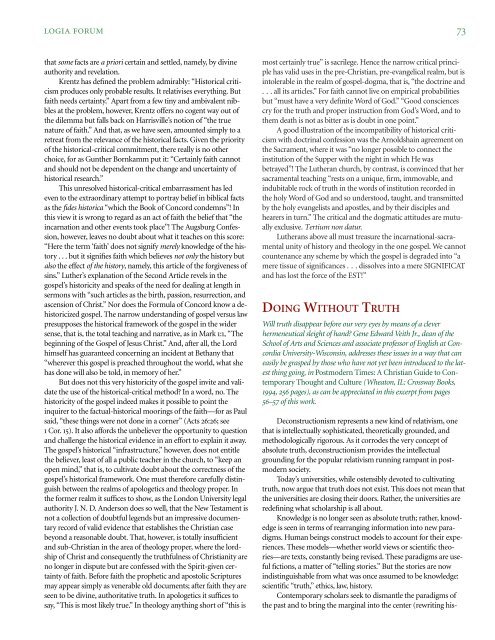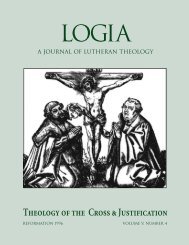04-2 Hermeneutics.pdf
04-2 Hermeneutics.pdf
04-2 Hermeneutics.pdf
- No tags were found...
Create successful ePaper yourself
Turn your PDF publications into a flip-book with our unique Google optimized e-Paper software.
LOGIA FORUM 73Deconstructionism represents a new kind of relativism, onethat is intellectually sophisticated, theoretically grounded, andmethodologically rigorous. As it corrodes the very concept ofabsolute truth, deconstructionism provides the intellectualgrounding for the popular relativism running rampant in postmodernsociety.Today’s universities, while ostensibly devoted to cultivatingtruth, now argue that truth does not exist. This does not mean thatthe universities are closing their doors. Rather, the universities areredefining what scholarship is all about.Knowledge is no longer seen as absolute truth; rather, knowledgeis seen in terms of rearranging information into new paradigms.Human beings construct models to account for their experiences.These models—whether world views or scientific theories—aretexts, constantly being revised. These paradigms are usefulfictions, a matter of “telling stories.” But the stories are nowindistinguishable from what was once assumed to be knowledge:scientific “truth,” ethics, law, history.Contemporary scholars seek to dismantle the paradigms ofthe past and to bring the marginal into the center (rewriting histhatsome facts are a priori certain and settled, namely, by divineauthority and revelation.Krentz has defined the problem admirably: “Historical criticismproduces only probable results. It relativises everything. Butfaith needs certainty.” Apart from a few tiny and ambivalent nibblesat the problem, however, Krentz offers no cogent way out ofthe dilemma but falls back on Harrisville’s notion of “the truenature of faith.” And that, as we have seen, amounted simply to aretreat from the relevance of the historical facts. Given the priorityof the historical-critical commitment, there really is no otherchoice, for as Gunther Bornkamm put it: “Certainly faith cannotand should not be dependent on the change and uncertainty ofhistorical research.”This unresolved historical-critical embarrassment has ledeven to the extraordinary attempt to portray belief in biblical factsas the fides historica “which the Book of Concord condemns”! Inthis view it is wrong to regard as an act of faith the belief that “theincarnation and other events took place”! The Augsburg Confession,however, leaves no doubt about what it teaches on this score:“Here the term ‘faith’ does not signify merely knowledge of the history. . . but it signifies faith which believes not only the history butalso the effect of the history, namely, this article of the forgiveness ofsins.” Luther’s explanation of the Second Article revels in thegospel’s historicity and speaks of the need for dealing at length insermons with “such articles as the birth, passion, resurrection, andascension of Christ.” Nor does the Formula of Concord know a dehistoricizedgospel. The narrow understanding of gospel versus lawpresupposes the historical framework of the gospel in the widersense, that is, the total teaching and narrative, as in Mark 1:1, “Thebeginning of the Gospel of Jesus Christ.” And, after all, the Lordhimself has guaranteed concerning an incident at Bethany that“wherever this gospel is preached throughout the world, what shehas done will also be told, in memory of her.”But does not this very historicity of the gospel invite and validatethe use of the historical-critical method? In a word, no. Thehistoricity of the gospel indeed makes it possible to point theinquirer to the factual-historical moorings of the faith—for as Paulsaid, “these things were not done in a corner” (Acts 26:26; see1 Cor. 15). It also affords the unbeliever the opportunity to questionand challenge the historical evidence in an effort to explain it away.The gospel’s historical “infrastructure,” however, does not entitlethe believer, least of all a public teacher in the church, to “keep anopen mind,” that is, to cultivate doubt about the correctness of thegospel’s historical framework. One must therefore carefully distinguishbetween the realms of apologetics and theology proper. Inthe former realm it suffices to show, as the London University legalauthority J. N. D. Anderson does so well, that the New Testament isnot a collection of doubtful legends but an impressive documentaryrecord of valid evidence that establishes the Christian casebeyond a reasonable doubt. That, however, is totally insufficientand sub-Christian in the area of theology proper, where the lordshipof Christ and consequently the truthfulness of Christianity areno longer in dispute but are confessed with the Spirit-given certaintyof faith. Before faith the prophetic and apostolic Scripturesmay appear simply as venerable old documents; after faith they areseen to be divine, authoritative truth. In apologetics it suffices tosay, “This is most likely true.” In theology anything short of “this ismost certainly true” is sacrilege. Hence the narrow critical principlehas valid uses in the pre-Christian, pre-evangelical realm, but isintolerable in the realm of gospel-dogma, that is, “the doctrine and. . . all its articles.” For faith cannot live on empirical probabilitiesbut “must have a very definite Word of God.” “Good consciencescry for the truth and proper instruction from God’s Word, and tothem death is not as bitter as is doubt in one point.”A good illustration of the incompatibility of historical criticismwith doctrinal confession was the Arnoldshain agreement onthe Sacrament, where it was “no longer possible to connect theinstitution of the Supper with the night in which He wasbetrayed”! The Lutheran church, by contrast, is convinced that hersacramental teaching “rests on a unique, firm, immovable, andindubitable rock of truth in the words of institution recorded inthe holy Word of God and so understood, taught, and transmittedby the holy evangelists and apostles, and by their disciples andhearers in turn.” The critical and the dogmatic attitudes are mutuallyexclusive. Tertium non datur.Lutherans above all must treasure the incarnational-sacramentalunity of history and theology in the one gospel. We cannotcountenance any scheme by which the gospel is degraded into “amere tissue of significances . . . dissolves into a mere SIGNIFICATand has lost the force of the EST!”DOING WITHOUT TRUTHWill truth disappear before our very eyes by means of a cleverhermeneutical sleight of hand? Gene Edward Veith Jr., dean of theSchool of Arts and Sciences and associate professor of English at ConcordiaUniversity-Wisconsin, addresses these issues in a way that caneasily be grasped by those who have not yet been introduced to the latestthing going, in Postmodern Times: A Christian Guide to ContemporaryThought and Culture (Wheaton, IL: Crossway Books,1994, 256 pages), as can be appreciated in this excerpt from pages56–57 of this work.
















